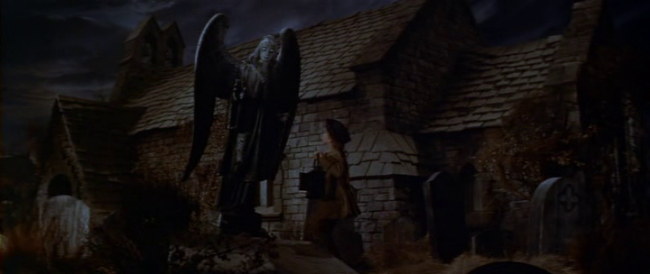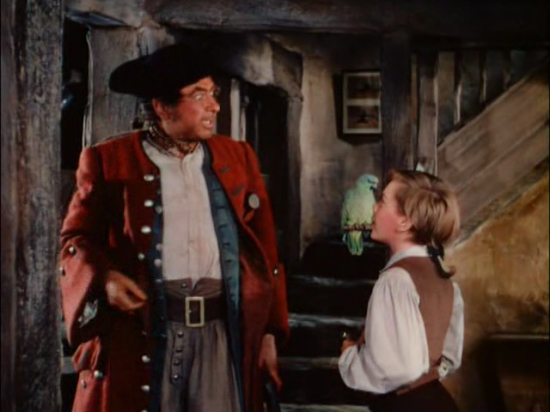
I found myself in the mood for a pirate movie a few days ago and I came to the realisation that I've probably seen all of them. All the ones made before 1970, anyway, and a good chunk of the ones made after. I decided it was high time I gave back to the world that has blessed me with such plunder by writing a top twenty list, especially since nearly all top pirate movie lists on the internet are naught but useless buckets of bilge water. The makers of them generally seem to dive in before realising they haven't actually seen many pirate movies so they end up including things like Porco Rosso and Serenity. Now, I love Porco Rosso and Firefly--Porco Rosso happens to be my favourite Ghibli movie. But you and I both know, when you google for pirate movies, that's not what you're looking for.
All the same, I will blur categories for my list very slightly. I'm including the small sub-genre of smuggler movies--you'll see what I'm talking about when I get to them. But to make it plain, my criteria for each film is that it be set before 1900, preferably in the 17th or 18th century, have something to do with sea voyages and criminality, and preferably have an element of swashbuckling. So here we go.

20. Yellowbeard (1983) my original review
I have to admit, I'm recommending this one more as a curiosity than for its quality of storytelling. It has half the cast of Monty Python, Cheech & Chong, Madeline Kahn, Peter Cook, James Mason, David Bowie, and Marty Feldman in his final role. The screenplay is more clever than actually funny but if you're interested in the Golden Age of Sail, you'll laugh more than the average viewer. My favourite line comes from James Mason as a sea captain: "These three people posing as pressees are in fact foul stowaways!"
19. The Crimson Pirate (1952)
I don't really like Burt Lancaster and he's definitely miscast as a pirate but I feel duty bound to include this one. At least it has a decent plot, possibly inspired by Red Harvest, and features Christopher Lee in an early role.
18. Pirates (1986)
Another one that's more of a curiosity than a genuinely entertaining film, I think director Roman Polanski is just not a good fit for the material. It's meticulously detailed and the Spanish galleon he had built for it is glorious. But it's perhaps no surprise that Holocaust survivor Polanski was more interested in showing how miserable life was for the common sailors aboard ship than he was in swashbuckling adventure. Which wouldn't be a problem if he weren't trying his damnedest to have fun. Still, Walter Matthau was inspired casting as a pirate captain.
17. Pirates of the Caribbean: The Curse of the Black Pearl (2003)
Johnny Depp gives a refreshing performance that took the genre in a whole new direction. Sadly, it lost momentum pretty quickly as subsequent films in the franchise settled into a dull cgi slapstick routine. Even the first film doesn't have the best screenplay in the world and I struggle to stay awake whenever I try to watch it again.

16. The Dancing Pirate (1936) my original review
This amusing musical comedy is about a dance instructor captured by pirates and then mistaken for a pirate himself. He doesn't help his reputation as a shady character when he teaches the local woman how to waltz.
15. Wake of the Red Witch (1948)
One of the few nautical adventures John Wayne starred in, this one is a tale of revenge on the high seas. It features some atmospherically filthy scenes in taverns and aboard ship.

14. Abbott and Costello Meet Captain Kidd (1952) my original review
Of all the pirate names to inspire fear on the seven seas, "Puddin' Head" ranks pretty low. But the film featuring that character is a decent pirate adventure. It succeeds more at that than at comedy, in fact, but Abbott and Costello are always a delight.

13. The Spanish Main (1945) my original review
It's got a fantastic wardrobe and Maureen O'Hara is an asset in any pirate movie. Sadly, Paul Henreid in the lead is dull and miscast and the screenplay is pretty lame.
12. The Sea Hawk (1940) my original review
One of the two pirate movies Errol Flynn made when he still had a lust for life, this one is loosely based on the life of Francis Drake and takes more than a few pages from Flynn's Robin Hood. It's got a grandeur to it and Flynn's enthusiasm at this stage in his career is always infectious.
11. Jamaica Inn (1939)
Here's one of those smuggler's movies I was talking about. Directed by Alfred Hitchcock from a Daphne du Maurier novel, it features Charles Laughton as a corrupt seaside country squire. Once again, Maureen O'Hara is also on hand to elevate the proceedings but it's already a good piece of atmospheric adventure.
10. 20,000 Leagues Under the Sea (1954)
It's not a terribly accurate adaptation of Jules Verne's classic novel but Disney does give us an invigoratingly garish piece of fantasy storytelling. It also has one of the qualities I consider to be the best part of a pirate movie, one that evokes something of the actual issues underpinning the real, historical pirate--is Captain Nemo a good man or a bad man? The tension between the two possibilities is the driving factor behind the best pirate movies ever made.

9. Captain Clegg (1962) my original review
And here's another one, also another smuggler movie. This is a Hammer movie--and, yes, I know Hammer made a few more, more genuinely pirate movies than this, but this is better than those. Peter Cushing plays the title character of ambiguous motive and morals and Oliver Reed costars as a smouldering young blade.

8. Against All Flags (1952) my original review
Maureen O'Hara starred in a lot of pirate movies but this is the only time she got to play a pirate herself. Her fiery performance runs circles around costar Errol Flynn, who by this point in his career was sedated by alcohol 24/7. She also has some nice swordplay, showing again the skill she'd demonstrated in At Sword's Point, a Three Musketeers movie from the same year.
7. Captain Blood (1935)
Here's peak Errol Flynn in a film based on a Rafael Sabatini novel. Somewhat based on the life of Henry Morgan, its title character is given a backstory some have speculated to be Morgan's, that he was a slave sent to the West Indies who escaped to become a buccaneer. Sabatini's novel is steeped in racism for how it depicts the contrast between black and white slaves. The film waters it down a lot, though you can still see it here and there. But it has a great duel between Flynn and Basil Rathbone and Olivia de Havilland is ravishing, wearing silky dresses amid the maximum splendour of 1930s production design.

6. Moonfleet (1955) my original review
Speaking of great production design, this one from Fritz Lang is a triumph of atmospheric sound stage exteriors. Plotwise, I have to admit to some bias here. It's not well written, bearing little resemblance to its source novel and a lot more to Treasure Island. But the production design combined with one of Miklos Rozsa's best scores is enough for me. Stewart Granger as the morally ambiguous smuggler gentleman (this is another smuggler movie) wins me over a little more each time. George Sanders and Joan Greenwood are absolutely delicious as demented aristocracy.
5. The Black Pirate (1926) my original review
This is one of the ones that really established a lot of the hallmarks of the genre. Douglas Fairbunks' acrobatic performance gave everyone the template for a swashblucking hero for the rest of cinematic history. It's also just an awesome spectacle. In the '20s, after the groundbreaking films of DeMille and Griffith, it sometimes seemed studios just didn't know when to stop building sets. And then they'd pile casts of thousands onto them, which is what you see here.

4. Anne of the Indies (1951) my original review
This is another one I have a big soft spot for. Directed by Jacques Tourneur, I think this is a spiritual successor to his famous 1942 horror film Cat People. Like that movie, this is a rare example of a woman being allowed to play a noir heroine. Normally women function as the two poles of moral choice for a conflicted male protagonist--either the wicked femme fatale, or the good girl next door representing wholesome home and family. Like Simone Simon in Cat People, Jean Peters' pirate Captain Providence tries to cut a path in a world dominated by the moral hypocrisy of the men around her. She's loyal and vindictive, shockingly ruthless yet desirous of validation. Every devious thing she's done seems to be matched by a devious thing done to her that no-one seems to acknowledge. It's hard to say what she deserves from a moral standpoint which makes this a perfect blend of noir and pirate film.
3. Peter Pan (1953) my original review
Disney adapts J.M. Barrie's story to be a perfect encapsulation of what and why kids used to fantasise about pirates. The freedom, the limitless wonder, the colourful characters, and the underlying tension between a child and its perception of the mysterious and sinister world of adults.
2. The Black Swan (1942) my original review
This one just has all the basic ingredients and cooks them to perfection. Tyrone Power as the captivatingly amoral lead displays his equally captivating fencing prowess. His treatment of Maureen O'Hara as the love interest is shocking even by to-day's standards but, as she showed in multiple swashbucklers, she could hold her own. This one also has magnificent shots of tall ships and George Sanders as Power's friend turned foe. This one is a triumph of pulp storytelling, the kind of unhinged voyage through morally murky waters that'll keep your eyes glued to the screen as you wonder how each scene will top the previous.

1. Treasure Island (1950)
I guess this is the obvious choice and it's number one on a lot of other lists. But it deserves it. Robert Louis Stevenson's novel is a brilliant work in itself and it had previously been adapted with the great Wallace Beery as Long John Silver. But there's just no competing with Robert Newton who, with this movie, defined the pirate in the public imagination forever after. His performance is also at the centre of the film's central dramatic question: is he a good man or a bad man? That's what Jim Hawkins, from whose point of view the story's told, is always tried to figure out. And since Silver is a surrogate father figure for Jim, it's a critical question and every scene shows how circumstances depend on its answer. From first meeting Silver at the inn, where he cunningly gets himself hired as ship's cook, to the moment he hands Jim a pistol and beyond. He's a captivating blend of repulsion and magnetism and the dilemma he presents is a reflection of just who the real historical pirate was: a pioneer for self-determination pitted against the oppressive ruling powers, or a ruthless murderer and tyrant himself?


























